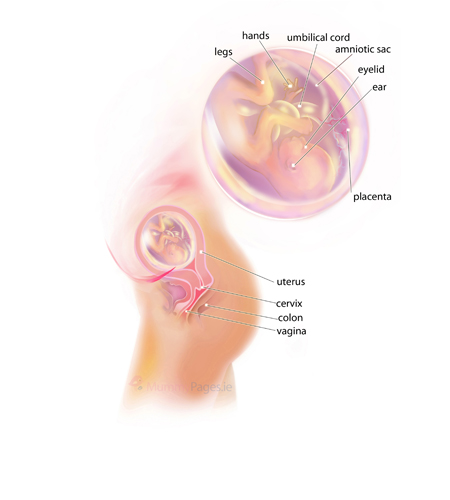Week 20 means that you have made it half way through your pregnancy! Your baby is steadily gaining weight and it probably feels like you have a melon in your belly. Although there are some new side effects coming in the second half of your pregnancy, you should feel pretty good at this point.

Your Baby this Week

Your baby is now around the size of a cantaloupe melon, or about 16.5cm (6.5 inches) from head to bottom and weighs in around 300 grammes (10.5oz).
Because a baby’s legs are curled up in the fetal position, during the first 20 weeks of pregnancy measurements are taken from the top of the head to the bottom. It’s referred to as the ‘crown to rump’ measurement. This week, your baby’s crown to rump measurement is around 16½ cm (6½ inches).
In week 20, your baby is swallowing amniotic fluid and the digestive system is producing meconium, which is the greenish-black sticky substance that results from your baby’s digestive system while in the womb. The meconium is stored in the bowels until birth. At that time, the meconium will help your baby have her first bowel movement. Occasionally, a baby will pass meconiom in the womb before birth or during labor. When that happens, sometimes the baby can inhale some of the meconium along with amniotic fluid which can be dangerous. This occurs in about 5 – 10 percent of all births and is more common when babies are past their due date. The danger of a baby inhaling the meconium is that there could be breathing problems including pneumonia.
During delivery, if a baby has passed meconium, it is immediately recognisable to the doctors. If meconium is present, the mouth and trachea is suctioned and in some cases, can be washed out with a saline solution. The baby will then be carefully monitored for several days. In most instances of meconuim aspiration, babies fully recover with no long term damage to the lungs.
Your Body this Week

Congratulations are in order - you are halfway there! 20 weeks is such a turning point in a pregnancy. The top of the uterus (the fundus) is now about level with your navel and your weight gain should be close to 4.5 kilos (10 pounds). You will more than likely gain ½ to 1 kilo (1 to 2 pounds) per week for the remainder of your pregnancy. Of course, this is based on an average sized, healthy pre-pregnancy weight. If you are too thin or overweight, your doctor will suggest the amount of weight you should gain each week.
You might start to notice sleeping difficulties now. As your belly grows, finding a comfortable position can be hard. Use extra pillows and try lying on your side with your leg propped up. It may also be comforting to place a pillow behind the small of your back.
During pregnancy, it’s important to make sure that you are receiving the proper amount of iron. Your body needs more iron now in order to move the added amount of blood in your body. In addition to your prenatal vitamins, you need to take a look at your diet. If you need to add more iron, consider red meat, one of the best sources of iron. The dark meat of poultry and shellfish are another great source of iron. If you’re not big on meat, consider including spinach and other iron-rich vegetables, soy products, raisins, prune juice, and cereals that are fortified with iron.
At this stage of your pregnancy, you may want to start looking into childbirth education classes. These classes are especially important for first time mums and dads. Ask your doctor to recommend a class. They will usually direct you to the hospital where you will be having your baby.






